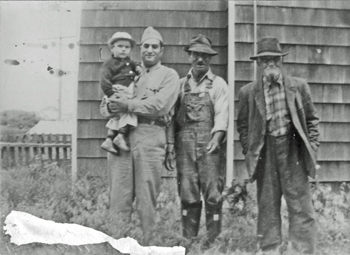New Bedford Fishing Heritage Center Grand Opening June 25th

Four generations of the Avila family in New Bedford. A young Rodney Avila at far left held by his father. The Fishing Heritage center is collecting and preserving community photographs.
The New Bedford Fishing Heritage Center will hold a Grand Opening on June 25th from 11am to 3pm at it’s location at 38 Bethel Street in the downtown historic district.
The Grand Opening event will feature demonstrations of industry skills such as net mending, dredge making, shucking, and filleting, as well as safety demos, model boat making, fishermen-led walking tours, and hands on children’s activities. Fresh local seafood will be available for sale and Center exhibits will be open free of charge during the event.
Programs at the center include:
Something Fishy is a free summer camp program now in its 9th year.
The camp curriculum is designed to provide New Bedford children with an introduction to the history and culture of the working port from whaling days to the present. Camp activities are largely project-based and include: hands-on marine science, arts and crafts, games, chantey singing, daily field trips to local maritime sites.
Documentary films about the commercial fishing industry and other aspects of the working waterfront are screened on the third Friday of each month at 7:00 PM in the theater of the New Bedford Whaling National Historical Park’s Corson Maritime Learning Center, located at 33 William Street.
Community Documentation Commercial fishing is often a family activity with skills and knowledge passed from one generation to the next. Consequently, much of this history resides in the photo albums, documents, and artifacts of fishing families. This project will digitize these materials through a day-long public event in combination with “house calls” to digitally document materials from individuals who are unable to attend the event. The project will be bookended by a variety of public programs which will serve to inspire community participation, evoke memories, and provide an interpretive framework for materials that are brought forward. Digitizing these materials, making them publicly available, and using them to tell the story of the fishing community will create a lasting legacy for families who have spent generations working the water in what is one of the nation’s oldest occupations.
(Correction: The June edition of the Fishermen’s Voice incorrectly reported that Heritage Center fundraising was used to renovate the center’s building and that it was located on the waterfront. However, the building was renovated by the landlords at their cost and the center is not on the waterfront but in the downtown historic district. Fundraising efforts are to support the development of exhibits set to open on June 25th, ongoing programming, and general operations.)
